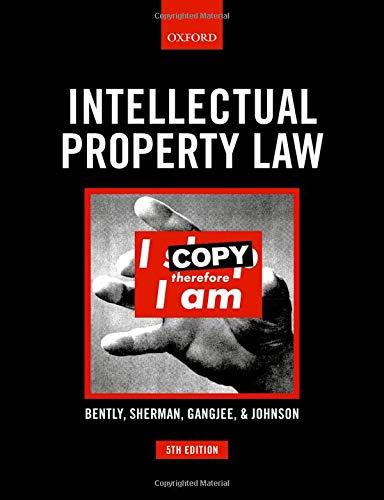Question
QUESTION 1 The law in the United States has been influenced by English, but not by French or Spanish law. a True b False QUESTION
QUESTION 1
The law in the United States has been influenced by English, but not by French or Spanish law.
a True
b False
QUESTION 2
Facilitating orderly change and maintaining the status quo are functions of the law.
- True
- False
QUESTION 3
The proponents of feminist legal theory argue that women should have superior rights to men in some circumstances due to the past unequal treatment of women.
- True
- False
QUESTION 4
According to the text, what is the definition of "law"?
- The list of actions a person must not perform
- A body of rules of action or conduct prescribed by controlling authority
- The acts a person must perform in order to assure fairness
- Optional rules for members of society to follow or ignore as they see fit
QUESTION 5
Persons who believe that law is "discovered" by men and women through the use of reasoning and choosing between good and evil, adhere to which school of jurisprudential thought?
- The Natural School
- The Historical School
- The Analytical School
- The Command School
QUESTION 6
What is an "equitable remedy"?
- A remedy fashioned by the chancery court to fit a particular situation
- A remedy granted by the merchant court
- A remedy that cannot be modified from its rigid prescribed form
- A remedy that must to be approved by the law court
QUESTION 7
After the American Revolution, the Continental Congress formed a federal government and adopted the U.S. Constitution.
- True
- False
QUESTION 8
A state can regulate in areas affecting interstate commerce where the federal government has chosen not to regulate if the statelaw does not place an undue burden on interstate commerce.
- True
- False
QUESTION 9
Substantive due process generally addresses the issue of whether or not a law is reasonably clear and not overly broad in scope.
- True
- False
QUESTION 10
Since declaring independence, the current U.S. Constitution is the _______ document to set out the general operations of the
- government.
- First
- Second
- Third
- Fourth
QUESTION 11
Under the Supremacy Clause of the U.S. Constitution, when Congress chooses to regulate in an area:
- It will automatically have exclusive jurisdiction to regulate in that area.
- States will always remain able to freely regulate in that area.
- States will always be able to regulate in that area so long as the state law does not directly and substantially conflict with the federal law.
- Whether the state has any authority to regulate in the area will depend on whether Congress provides that the federal government has exclusive authority to regulate in that area.
QUESTION 12
The Privileges and Immunities Clause provides that:
- It is a privilege to be granted immunity from a criminal prosecution.
- States must not unduly discriminate in favor of their citizens.
- Corporations receive most of the same constitutional protections as individuals.
- The government is not subject to being sued unless the constitutional matter is a right rather than a privilege.
QUESTION 13
The reasonable person standard is used in determining the duty of care in a negligence case.
- True
- False
QUESTION 14
Guest statutes apply to persons in someone's home with the permission of the homeowner.
- True
- False
QUESTION 15
Some states allow a licensed professional to bring an action to prevent an unlicensed person frompracticing in that profession.
- True
- False
Step by Step Solution
There are 3 Steps involved in it
Step: 1

Get Instant Access to Expert-Tailored Solutions
See step-by-step solutions with expert insights and AI powered tools for academic success
Step: 2

Step: 3

Ace Your Homework with AI
Get the answers you need in no time with our AI-driven, step-by-step assistance
Get Started


